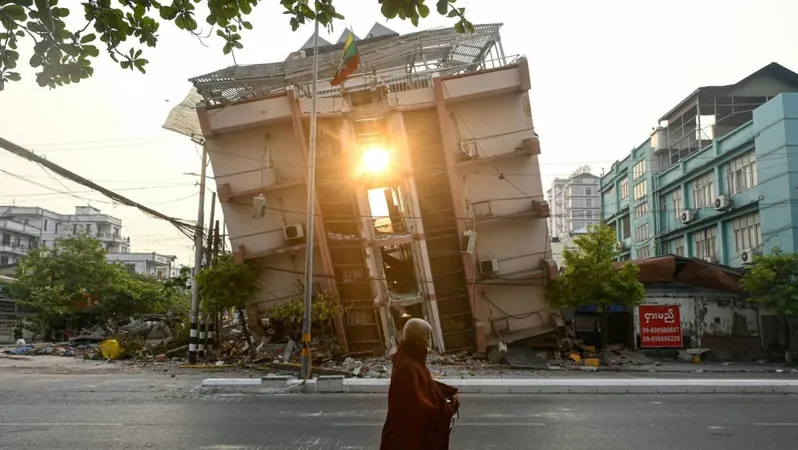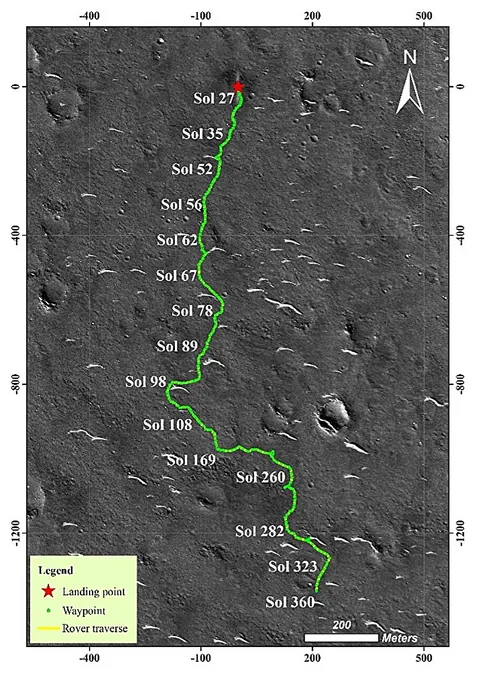
Myanmar Earthquake Catastrophe: Over 2,700 Dead, Survivors Struggle for Basic Needs Amid Civil War Challenges
2025-04-01
Author: Yu
BANGKOK: In the aftermath of a devastating earthquake that struck Myanmar, aid organizations are urgently calling for shelter, food, and clean water as the death toll has tragically surpassed 2,700. Myanmar's military leader, Min Aung Hlaing, announced a grim tally of 2,719 confirmed casualties during a televised address on April 1, with figures anticipated to exceed 3,000. Meanwhile, over 4,500 individuals are reported injured, and 441 are still unaccounted for.
The earthquake, which registered a powerful 7.7 on the Richter scale, hit during lunchtime on a Friday, marking it as the most potent seismic event to impact the region in over a century. The quake caused catastrophic damage, leveling both ancient pagodas and modern buildings, particularly affecting areas like Mandalay, near the epicenter.
In a tragic incident, the United Nations Office for the Coordination of Humanitarian Affairs reported that at least 50 children and two teachers lost their lives when a preschool collapsed in Mandalay. As local communities grapple with the destruction, the International Rescue Committee emphasized the dire need for food, water, shelter, and medical assistance in the hardest-hit regions.
One IRC worker from Mandalay shared the harrowing reality facing survivors, stating, "Having lived through the terror of the earthquake, people now fear aftershocks and are sleeping outside on roads or in open fields." The ongoing civil war in Myanmar complicates relief efforts; since the junta's coup in 2021, access to injured and displaced individuals has been severely restricted.
Human rights organization Amnesty International has urged the junta to permit humanitarian aid to reach regions under rebel control. Activists have reported airstrikes by military forces in the aftermath of the earthquake, raising concerns about the government's intentions toward providing aid.
"Myanmar's military has a longstanding practice of denying aid to areas where opposition groups are active," commented Joe Freeman, a Myanmar researcher for Amnesty. He stressed the necessity for immediate, unfettered access for humanitarian organizations, advocating for the removal of bureaucratic obstacles blocking aid.
The junta's stringent control over communication, paired with extensive damage to essential infrastructure, poses additional hurdles for aid workers striving to reach those in need. Meanwhile, as local and international rescuers continue to search through rubble, a sense of hope dwindles regarding finding additional survivors.
In the neighboring capital of Thailand, ongoing efforts are focused on an unfinished skyscraper that collapsed during the quake. Rescuers are facing grim odds, as it has been four days since the disaster. Deputy Governor of Bangkok, Tavida Kamolvej, reported that while scanning equipment detected six human-shaped figures, there were no signs of life.
The death toll in Thailand has reached 20, with 74 people still missing from the debris of the collapsed building. Reports have emerged indicating that substandard steel may have contributed to the building's failure, prompting the Thai government to launch an investigation into the collapse.
As the situation unfolds, the international community watches with bated breath, hoping that necessary aid and support reach the people of Myanmar, while fearing that bureaucratic and military obstacles may hinder these efforts for months to come.




 Brasil (PT)
Brasil (PT)
 Canada (EN)
Canada (EN)
 Chile (ES)
Chile (ES)
 Česko (CS)
Česko (CS)
 대한민국 (KO)
대한민국 (KO)
 España (ES)
España (ES)
 France (FR)
France (FR)
 Hong Kong (EN)
Hong Kong (EN)
 Italia (IT)
Italia (IT)
 日本 (JA)
日本 (JA)
 Magyarország (HU)
Magyarország (HU)
 Norge (NO)
Norge (NO)
 Polska (PL)
Polska (PL)
 Schweiz (DE)
Schweiz (DE)
 Singapore (EN)
Singapore (EN)
 Sverige (SV)
Sverige (SV)
 Suomi (FI)
Suomi (FI)
 Türkiye (TR)
Türkiye (TR)
 الإمارات العربية المتحدة (AR)
الإمارات العربية المتحدة (AR)